VATICAN: Vatican Releases Instrumentum Laboris to Guide October Session of Synod on Synodality

Release of Instrumentum Laboris. Credit Courtesy photo
Sr. Jecinter Antoinette Okoth, FSSA
The Vatican, through the responsible team working towards the upcoming 16th Ordinary General Assembly of the Synod of Bishops slated for the month of October, has released a working document referred to as Instrumentum Laboris, that will be used by delegates as a guiding tool for the discussions that will help lead the Church to a synodal conversion.
The document released Tuesday, June 20, has come after a process of listening to the people of God in the local churches and the various stages of discernment by the Bishops’ Conferences and Continental Assemblies a process which began way back in 2021.
The document highlights that the Instrumentum Laboris “is not a summary of the journey, but rather the fruit of the experience of what has been learned about the nature of the synodal Church.”
Additionally, Vatican officials say the Instrumentum Laboris which is guided by the Holy Spirit who accompanied and guided the journey in the local churches, “bears witness to the faith experience of the People of God and the points on which they feel called to take further steps to deepen the practice of the synodal dimension of the Church.”
In their Tuesday message, Vatican officials acknowledged that the various stages of the synodal journey especially the continental stage, have made it possible for the Church to identify specific concerns by the Church in different regions of the world.
They noted in the document that the results from the discussions by the local churches revealed the existence of too many wars that stain the world with blood hence “a call for a renewed commitment to building a just peace.”
They identified further challenges saying, “The threat represented by climate change implies a necessary priority of caring for the common home, the cry to oppose an economic system that produces exploitation, inequality and a throw-away culture, and the desire to resist the homogenising pressure of cultural colonialism that crushes minorities. Situations of persecution to the point of martyrdom and emigration that progressively hollow out communities, threatening their very survival are deeply lamented.”
The documents reads further: “The local Churches have spoken of their concern to be equipped to address urgent social realities, from the growing cultural pluralism that now marks the entire planet, to the experience of Christian communities that represent scattered minorities within the country in which they live, to the experience of coming to terms with an ever more advanced, and at times aggressive, secularisation that seems to consider religious experience irrelevant, but where there remains a thirst for the Good News of the Gospel.”
Additionally, the Churches have been affected by a crisis caused by various forms of abuse, including sexual abuse and the abuse of power, conscience and money.
The Instrumentum Laboris has highlighted the methodology for use in the Assembly as it contains a text and fifteen worksheets that point out the characteristics of the synodal Church, that has emerged through the experience of the past two years.
The issues for discussion are crafted from the three words that constitute the theme of the Synod, i.e. communion, mission and participation, where participants will reflect on how to grow in communion by welcoming all, and not excluding anyone, in fidelity to the Gospel, ways of exercising co-responsibility, recognizing and valuing the contribution of each baptized person in view of the common mission and the identification of structures and dynamics of governance through which to articulate participation and authority over time in a missionary synodal Church.
The approaches to the discussion will consider; the diversity of people, their social, cultural and religious contexts, as they emerged during the process to be better appreciated and considered in discernment.


